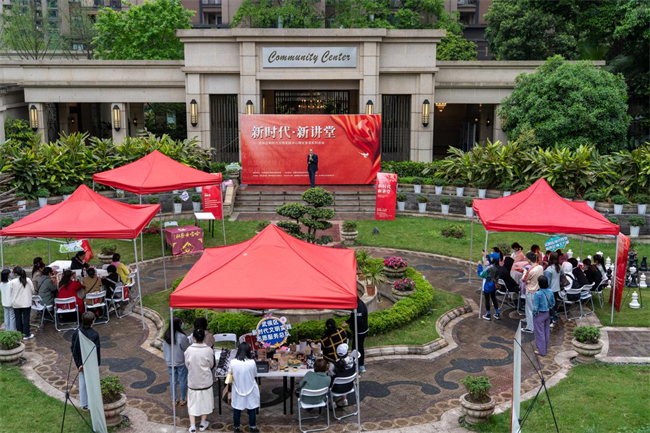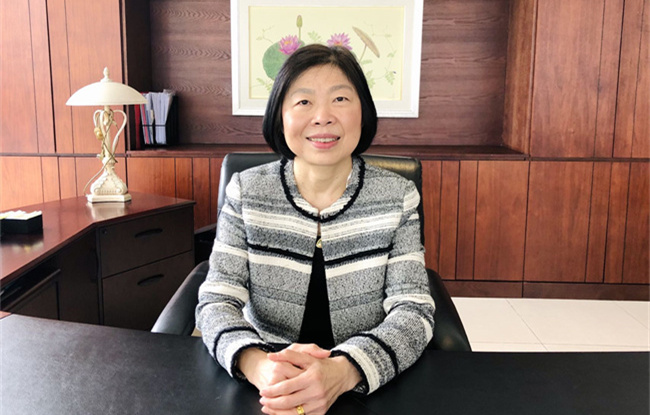RCEP Opportunities in Sichuan丨Consul General Adelle Neary: Enterprises from Australia and Sichuan Expected to Seize Market Opportunities in Third Country
After the Regional Comprehensive Economic Partnership (RCEP) took effect, 65% of the ASEAN, Australia and New Zealand exports to and from China has been subject to zero tariffs.
Under the framework of the RCEP, which is the world's largest free trade agreement (FTA), 90% of products traded in the region are expected to enjoy zero tariffs in about a decade.
Data from Chengdu Customs shows that members of RCEP are important trading partners of Sichuan as Sichuan's foreign trade volume with them accounts for about one-third of the province's total. Among all the member countries, New Zealand and Australia are the two major exporters to Sichuan in terms of resource and agricultural products.
Yuan Mei, a Chinese poet of the Qing Dynasty, wrote in his poem Spring Breeze, "Like an honored guest, the spring breeze brings us prosperity when it arrives." How can Sichuan avail itself of the RCEP to promote regional economic and social development and opening-up to a higher level? Sc.china.com will roll out a series of interviews with the consuls general of RCEP member states in Chengdu on what new opportunities will the RCEP bring to Sichuan.

(Adelle Neary, Consul General of Australia in Chengdu)
Interview2: with Adelle Neary, Consul General of Australia in Chengdu
Sc.china.com: On January 1, 2022, the RCEP officially entered into force for Australia. What new policies and measures will Australia implement to advance the FTA? What are the key fields?
Adelle Neary: Australia is pleased to be a party to the RCEP Agreement. We are seeking new opportunities brought by it.
When it comes into force, Australia will improve and expand market access, facilitate cross-border investment and the development of regional value chains, and enhance cross-border e-commerce, including through the delineation of strong rules on e-commerce. We expect to realize benefits from enhanced regional connectivity and from putting ASEAN at the heart of new economic architecture. Moreover, Australia also attaches importance to enhancing regional interconnection and promoting unity and standardization of trading rules amid members through RCEP. We take the opportunities of regional cooperation seriously.
Sc.china.com: What impacts and changes do you think RCEP will bring to economic and trading cooperation between the two countries as it officially entered into force?
Adelle Neary: RCEP will deliver a range of improvements to members, especially in areas where we both have the greatest growth potential, such as services, investment and digital trade. RCEP locks in market access and addresses non-tariff barriers to create new trade and investment opportunities across member countries and establishes rules that provide greater certainty and improve the overall business environment.
As Australian Minister for Trade, Tourism and Investment Dan Tehan said on October 31, 2021, this agreement will make it easier for enterprises and investors to operate by strengthening regional value chains which ultimately will lead to more jobs, opportunities and economic growth.
Notably, RCEP formulates stronger rules on e-commerce and safeguards for Australian and Chinese enterprises to help them manage their data in suitable ways. At the same time, RCEP also contains protections for consumers. It requires signatories to protect personal information, deal with 'spam' messages and protect online consumers from fraud and misleading conduct.
In addition, RCEP includes provisions on intellectual property to support the protection and strengthen enterprises' capacity to protect and enforce their rights. RCEP also has substantive rules on competition, actually the first time for RCEP members. These rules require all RCEP parties to adopt or maintain competition laws, including the prohibition of anti-competitive activities and ensure independent enforcement of those laws. We can benefit from the in-depth regional economic connection.
Sc.china.com:Australia and Sichuan have maintained long-term and close economic and trade cooperation. According to the statistics of Chengdu Customs, in 2021, the exports between Sichuan and the Australia reached 10,252.9 million yuan, an increase of 5.0% year on year; the imports between Sichuan and Australia recorded 5611.34 million yuan, up 74.2% year on year. What new opportunities do you see for Sichuan enterprises in Australia after the RCEP took effect?
Adelle Neary: Australia and Sichuan enjoy a long-standing and close trade and investment relationship. The Australian Trade and Investment Commission (Austrade) established its office in Chengdu in 2000, and the Australian Consulate-General in Chengdu opened in 2013. As of 2021, Australia was Sichuan’s tenth largest trading partner. About one-third of Sichuan’s total overseas investment is in Australia, so we know Sichuan investors view Australia as an attractive destination.
For foreign trade enterprises in Australia and China, RCEP defines a single set of rules and procedures for obtaining preferential tariff treatment and reveals the regular pattern of the modern production process and logistics operation. In a word, these outcomes will support enterprises’ access to regional value chains. For example, RCEP will make it more attractive for food processors in Sichuan to source primary produce from Australia, and then re-export value-added goods to other RCEP parties. Australian and Sichuan firms may be able to realize opportunities directly and in third-country markets, particularly in sectors like health, education, food and beverage, and professional services where existing connections are strong.
As an example, image some Australian fruit. Fruit exported by Australian enterprises could be exported to Sichuan more easily. Food processing enterprises in Sichuan could then process this fruit and sell the resulting products to consumers in other member countries through the RCEP agreement. For enterprises under the agreement, the production and transportation costs will be reduced. Ultimately, consumers will benefit from the agreement for they can purchase products with higher quality but lower prices.
Sc.china.com:What do you think of the prospects of cooperation between Australia and Sichuan after the RCEP took effect?
Adelle Neary: RCEP is a modern and comprehensive free trade agreement. I am confident it will give impetus to regional economic growth and deliver new regional business opportunities. In my first year as Australian Consul General in Chengdu, I have observed how important Southwest China’s trade and investment ties are with Southeast Asia. At present, some well-known Australian firms have settled in Sichuan, like Cochlear, the bionic ear manufacturer. I am sure these firms will seize the opportunities brought about by enhanced regional economic integration.
But, perhaps most critically, RCEP directly facilitates the growth of regional value chains, supporting trade between Australian and Sichuan firms in third-country markets and encouraging the export and re-export of value-added goods. On top of trade and investment links, I also believe that RCEP will help support people-to-people links, cultural exchanges and boost cross-border movement once international travel is normalised.(Chen Min)
Recommend for you
Business
- Luzhou Vocational & Technical College Held the Annual Meeting of Chengdu-Chongqing Twin Cities Economic Circle Smart Retail Alliance
- How Strong Is the Cultural and Creative Atmosphere in Chengdu? Fanmate May Be One of the Answer
- The 24th Chengdu International Automobile Exhibition Will Open Soon
- Nearly 300 Design Teams Signed up for the Chengdu Community Beauty Space Global Concept Scheme Collection
- JOUAV: To Introduce Chinese-Made Drones To the world
- Leaders of Guangyuan City Made An Secret Investigation to Supervise Ecological Environmental Protection
View
- Welcome to Shimian County for A Happy New Year
- Winter of Chengdu: To Date Wintersweet in the Park City
- Colors of Sihchuan
- Sichuan Huaying Slag Field into Ecological Spotty Shot
- Go and Participate in Environmental Protection Activities in the Coming Low-carbon Day
- The 2021 APEC Women's Leadership Forum Will Be Held in Chengdu in September




